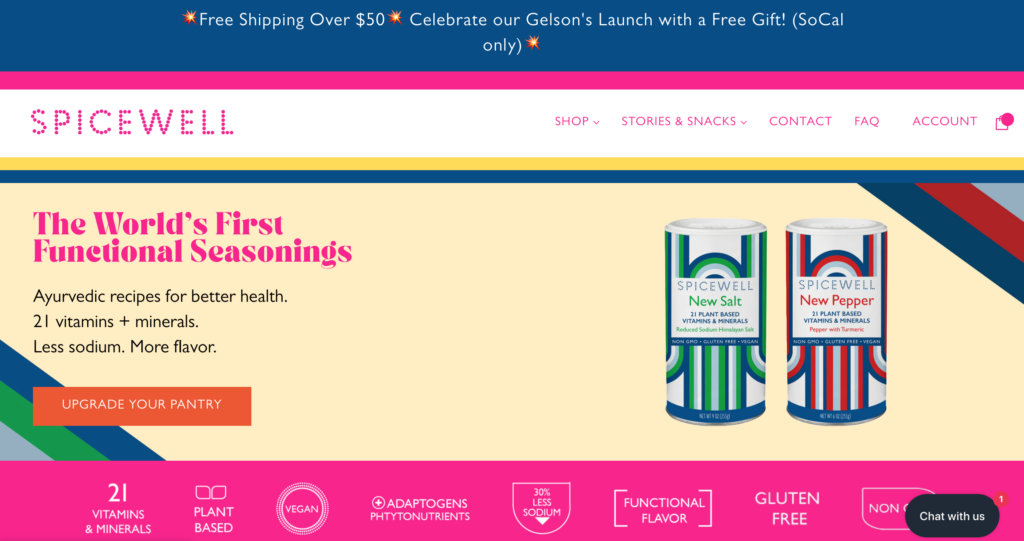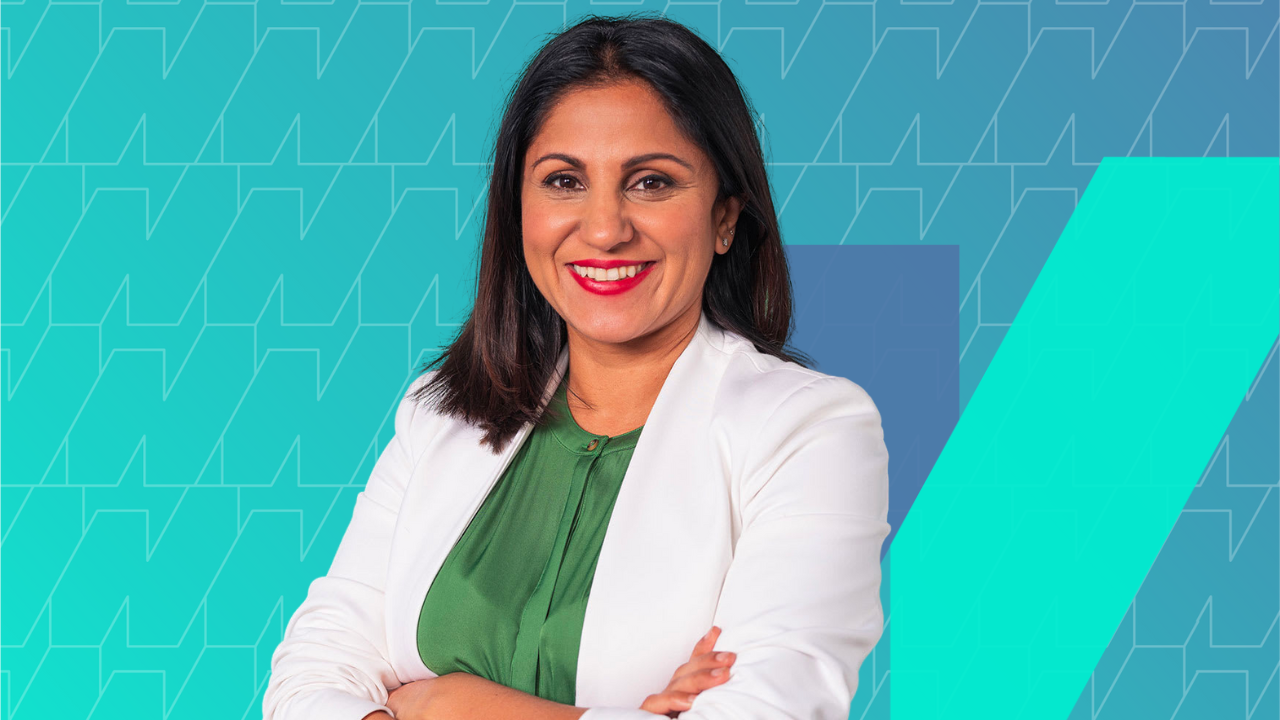Raina Kumra is a serial entrepreneur with an impressive track record. When she sees a problem, she rolls her sleeves and works on a solution. Most recently, she’s tackling the health crisis in her own way.
Nursing her daughter and husband back to health when they were sick opened up Raina’s eyes even more to the idea of food as medicine. So she decided to start her own company to address the nutritional deficiencies many of us face. And Spicewell was born.
Her line of functional spices is growing, and the sky’s the limit. She earned $14k alone during her launch month, and growth so far has been 600{57b8cc37fd24bce1cf64c8b05d9407ce9171516056c1f5e762677747187a0de4} month-on-month.
Keep reading to find out:
- About Raina’s impressive entrepreneurial background
- How she helped her husband and daughter recover after their accidents
- What exact problem she’s looking to solve
- What her spices do for the body
- How much Spicewell has grown since it was launched
- What the future holds for the company
- Raina’s views on SEO
- The tools and resources she’s used
- Her biggest challenge
- Her greatest accomplishment
- What she wishes she knew when she started
- Her advice for other entrepreneurs
Meet Raina Kumra
My name is Raina, and I grew up with Ayurveda. I learned from my mother and grandmother that the first stop when illness strikes isn’t the drug store—it’s the spice drawer.
I had a great multi-decade career spanning tech, media, investing, and government. I spent the first part of my career in advertising, crafting digital campaigns for Nike, Levi’s Johnny Walker, and ESPN. I led digital at one of the most respected ad agencies in the world, W+K, and then I did a 180 because I knew I had to do more than sell things.
I started a solar training non-profit called Light Up Malawi, and when that got acquired, I took a job at the State Department working on diplomatic innovation. That led to co-leading innovation at a federal bureau for international media and information, where I was handpicked by Walter Isaacson and President Obama.
After that, I moved back home to California and joined a venture-funded tech startup as a co-founder. I then moved from founder to investor and worked with Omidyar, led a technology ethics movement, and finally started The Fund LA.
All the while, I consulted with Fortune 50 companies and continue to be an advisor to Google X’s moonshots. Even during that time, functional medicine was something that called me. And, perhaps for the first time since childhood, I decided to listen.
Why She Created Spicewell
Mid-pandemic, my family went through a bit of a health crisis.
My husband had just had knee surgery and was laid up, and the next morning my daughter broke her collarbone. So then I had two patients and another child to care for. And caretaking is the hardest job in the world.
I was very focused on getting them healthy as fast as possible, and I knew I would do it through food. I hid vegetables I took from my garden in my 5-year-old’s food by dehydrating and powdering them to blend into her smoothie and sprinkle on her soups. It took my daughter only 7 days to be back on her feet again, while most people with broken collarbones take at least two weeks.
I did the same for my husband, dosing them with turmeric and other medicinal herbs and spices. They both healed tremendously fast. Once they healed and I returned to my kitchen, I had all these vegetable powders lying around and put on my hat of solving problems at scale.
I asked myself, how could I impact the nutrient deficiency we all face without changing habits? I looked down at the salt and pepper on my counter, and Spicewell was born.

The Inspiration Behind Raina’s Project
I began formally studying plant medicine to deepen my understanding of the science behind where our medicine originally came from. I understood how the food we eat has an outsized impact on our ability to fend off chronic disease.
I began researching that our soil has fewer nutrients now than ever and that the food grown in this soil is also less nutritional. I came to understand how our entire food and health system was broken.
And no matter how well we eat, we’re still not getting enough of what we need. I learned that most Americans are walking around with a nutrient deficiency and that there’s a direct link to chronic illness.
And, being the problem-solver and movement-builder I am at my core, I was determined to fix this at scale.
I set out to solve this problem by starting with the first nutrient-dense and lower-in-sodium salt and pepper. I’ve added ancient Ayurvedic formulations known to help the body and mind adapt to inflammation and stress and 21 vitamins and minerals to eat with your food—the way they were always meant to be absorbed.
We were lucky to have Dr. Mark Hyman and Ann Veneman as our earliest advisors, both true believers in the power of food.
Spicewell’s Growth
We’ve grown so much in our first year, we landed in our first retailer (Gelson’s), and we’re headed to several more exciting ones very soon.
Our New Pepper was nominated for a NEXTY award, which is very critical in the food industry, and we were honored with a Trendsetters spotlight at the Fancy Food Show, which was our first time exhibiting. All of this was such a surprise, and we couldn’t even believe it.
It’s wonderful to hear from our customers that they have completely swapped out their salt and pepper with ours and only use us now. It’s so lovely to hear that it is helping people’s parents with their arthritis symptoms, and parents send it to their undernourished college children all the time, and moms use it to sneak vegetables into their kids.
The Future of Spicewell
This next year will be all about retail growth and partnerships.
We have several collaborations coming up, and we’re so excited to be working with Chef Palak Patel on our trio of seasonings: Tandoori, Indian Taco, and Bullion, which will be launching this spring. She’s a force in the kitchen and so fun to work with.
And beyond that, we’ve just launched several new items in our quest to take over your kitchen, your pantry, and your diet with easy-to-swap-out ingredients that are simply, better, and more functional.
The vision isn’t just to have a successful CPG company or create an enduring brand. The vision, for me, is to put back on my policy hat and head back to DC once this is commercially successful and use Spicewell to drive change in food policy.
There are so many ingredients in our food that we shouldn’t be eating. That makes us ill and ages us faster. That leads us directly into the hands of Big Pharma. I want to change that and give Americans a better chance at living healthy lives.
How Much Money Raina is Making
This information is private for the moment, but we did make $14K in our launch month, and this past December, have shown growth above 600{57b8cc37fd24bce1cf64c8b05d9407ce9171516056c1f5e762677747187a0de4} MoM.
Her Top Marketing Strategy
We publish a lot of content, and that has really helped us.
But our number one strategy is to strike a balance between online and offline: spending time IRL and activating word of mouth and pairing it with solid digital awareness.
We utilize the power of word of mouth and sampling more than any other strategy.
Her View of SEO
SEO is mission-critical. I would rather invest more in SEO than ads in the long term.
Regarding content, we were more buttoned up about this in the first few months, but now we just wing it and have a good time guessing what people want to hear about most.
As for link building, we’ve done a few content experiments and worked with some vendors who do backlinking and had some success with it for our page rank.
Her Favorite Resources and Tools
I love newsletters like the Consumer Packaged Goods Directory (CPGD) and Food Dive, and communities like Foodboro and StartupCPG, and absolutely Naturally LA!
The three tools we use the most are Klaviyo, Shopify, and Hootsuite.
Raina’s Biggest Challenge
What’s been most difficult has been finding a sustainable supply for packaging.
The packaging industry is so flawed! Sourcing ingredients and transparency are also very important to us.
Her Greatest Accomplishment
Going beyond the initial idea to the first product—that’s always the hardest and most thrilling part.
What She Wishes She Knew When She Started
I wish I had known several things:
- Businesses take years of care and feeding before they can cross over to that overnight success moment. It’s all behind the scenes, while the ‘Instagram version’ of founding a company is incredibly damaging and discouraging.
- How important it is to find my people and community to journey with
- That taking investor money was just about the same as getting married to them
- I wish someone had told me how ridiculous the packaging industry is and how awful it is for the planet. I didn’t realize just how much plastic was being pushed at me until I really began searching for plastic-free packaging options. It took me 12 weeks to find the right packaging that was also compostable/recyclable and using post-consumer waste plastic—-by far the biggest surprise in this business.
Her Advice for Other Entrepreneurs
This is a tough time to build, but those who persevere in this time are more likely to succeed in the long term because that’s the recipe for building real healthy businesses!
